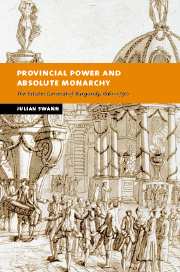Book contents
- Frontmatter
- Contents
- List of illustrations
- List of figures
- List of appendices
- List of map
- Preface
- List of abbreviations
- Map: The duchy of Burgundy in the eighteenth century
- 1 Historians, absolute monarchy and the provincial estates
- 2 Ancien régime Burgundy
- 3 The Estates General of Burgundy
- 4 Nosseigneurs les élus and the officers of the Estates
- 5 The provincial administration: authority and enforcement
- 6 ‘It's raining taxes’. Paying for the Sun King, 1661–1715
- 7 Provincial administration in an age of iron, 1661–1715
- 8 The limits of absolutism: crown, governor and the Estates in the eighteenth century
- 9 Provincial rivalries: the Estates and the Parlement of Dijon in the eighteenth century
- 10 Tax, borrow and lend: crown, Estates and finance, 1715–1789
- 11 An enlightened administration?
- 12 The coming of the French revolution in Burgundy, 1787–1789
- Conclusion
- Appendices
- Bibliography
- Index
9 - Provincial rivalries: the Estates and the Parlement of Dijon in the eighteenth century
Published online by Cambridge University Press: 05 July 2009
- Frontmatter
- Contents
- List of illustrations
- List of figures
- List of appendices
- List of map
- Preface
- List of abbreviations
- Map: The duchy of Burgundy in the eighteenth century
- 1 Historians, absolute monarchy and the provincial estates
- 2 Ancien régime Burgundy
- 3 The Estates General of Burgundy
- 4 Nosseigneurs les élus and the officers of the Estates
- 5 The provincial administration: authority and enforcement
- 6 ‘It's raining taxes’. Paying for the Sun King, 1661–1715
- 7 Provincial administration in an age of iron, 1661–1715
- 8 The limits of absolutism: crown, governor and the Estates in the eighteenth century
- 9 Provincial rivalries: the Estates and the Parlement of Dijon in the eighteenth century
- 10 Tax, borrow and lend: crown, Estates and finance, 1715–1789
- 11 An enlightened administration?
- 12 The coming of the French revolution in Burgundy, 1787–1789
- Conclusion
- Appendices
- Bibliography
- Index
Summary
Institutional life in ancien régime France was characterised by almost constant conflict as rival corps fought to maintain their status, power and privileges. For the king, who was the source and the guarantor of corporate rights, these quarrels were frequently more of a nuisance than a threat, and they helped to ensure that combined challenges to his authority, such as that experienced during the Fronde, were extremely rare. Within individual provinces, especially the pays d'états, it might be expected that local privileges would provide a rallying point for these fiercely independent corps. In practice, the amount of collaboration was limited. In his study of seventeenth-century Languedoc, Beik has demonstrated that the province's rulers ‘shared common aspirations, but the modes of operation of their institutions set them against one another in a perpetual equilibrium of adversarial relationships which only the king could arbitrate’. James Collins has also identified areas of conflict in Brittany, but he adds that ‘in general, the Estates, the Parlement and chamber [Chambre des Comptes] would work together’ to protect their own interests and those of the province. There is no doubt that in the right circumstances cooperation between institutions was possible, and this was illustrated most dramatically during the reign of Louis XV, when a combination of growing hostility to taxation and bitter personal rivalries provoked the infamous Brittany affair. The Estates and Parlement formed a united front, eventually forcing the imperious local commandant, the duc d'Aiguillon, from the province.
- Type
- Chapter
- Information
- Provincial Power and Absolute MonarchyThe Estates General of Burgundy, 1661–1790, pp. 262 - 294Publisher: Cambridge University PressPrint publication year: 2003

